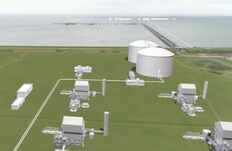- The project includes an ammonia import terminal and a 1 GW electrolysis plant.
- The facility will supply 10-20% of Germany's hydrogen demand by 2030.
- Key companies involved are bp, Gasunie, Nowega, NWO, Salzgitter, Thyssengas, and Uniper.
- Project timeline: planning in 2023, construction 2024-2025, operational by 2027.

Project Overview
Uniper is transforming Wilhelmshaven into a central hub for green hydrogen-based energy sources. This initiative is crucial for Germany to meet its net zero targets, given the current shortfall in domestic renewable electricity production. The project will diversify energy supply and reduce dependency on singular energy suppliers.
Key Infrastructure
Green Wilhelmshaven will feature an ammonia import terminal and a 1 GW electrolysis plant, capable of producing around 300,000 metric tons of hydrogen annually. This will meet 10-20% of Germany's projected hydrogen demand by 2030. The project is included in the Ten-Year Network Development Plan (TYNDP) for 2022 by ENTSOG, highlighting its significance in European climate and energy goals.
Hydrogen Infrastructure
The project will include a hydrogen pipeline connection and a tie-in point to the future European Hydrogen Backbone. It will also have access to local hydrogen underground storage at the Etzel salt cavern site. The infrastructure will support industrial off-takers, including steel producers, the chemical industry, and refineries across Germany.
Timeline and Development
The project timeline includes finalizing planning and design in 2023, beginning construction of the ammonia import terminal and electrolysis plant in 2024-2025, and achieving full operational capacity by 2027. Initial hydrogen production and distribution are expected to start in 2027, with scaling up of production continuing through 2030.
Collaborations and Alliances
A corporate alliance, including bp, Gasunie, Nowega, NWO, Salzgitter, Thyssengas, and Uniper, is linking hydrogen projects across northwestern Germany. The project also aims to become a Project of Common Interest (PCI), enhancing its role in linking EU energy systems and contributing to climate and energy targets.

